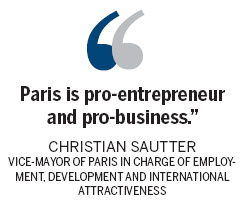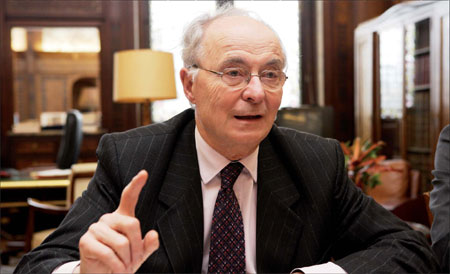Paris seeks to regain luster
Updated: 2013-04-05 09:17
By Li Xiang (China Daily)
|
|||||||||||
|
Christian Sautter, vice-mayor of Paris, wants to secure greater investment from China. Provided to China Daily |
 |
A business exodus from France is among the factors making city rethink its strategy
Paris is aiming to lure more foreign investment by polishing its pro-business message as it looks to assuage foreign investors' concerns about France's declining allure as a destination for industrial investment.
"Paris is pro-entrepreneur and pro-business," Christian Sautter, vice-mayor of Paris in charge of employment, development and international attractiveness, told China Daily in a recent interview, when asked about the growing worries among foreign investors about France's business environment.
"Investment conditions remain good, especially for foreign companies looking for research and development facilities, where France remains competitive," he says.
| ||||
Sautter says one of the priorities of the French capital is to secure greater investment from China, which was ranked the second-largest foreign investor after the United States last year in terms of number of investment projects.
Ten of the 60 foreign investment deals were made by Chinese enterprises and created 160 jobs in Paris, Sautter says.
"We are more interested in dynamism than in how big an investment is," he says, noting that the potential of Chinese investment is vast given the emerging strength of private consumption in China, and given that the current value of investment is now relatively small.
In recent years France has been increasingly less attractive to foreign investors put off by the country's high labor costs and complex tax system.
A recent report by a French think tank, Foundation Concorde, says the country had lost about 1 million jobs in the past 20 years as a result of entrepreneurs and business leaders fleeing the country because of its tax system.
The country's business leaders have criticized the 75 percent tax rate that the present Socialist government has said top earners should pay.
Sautter says France's expertise and advantage in public utilities, pollution treatment and research facilities in trying to persuade Chinese enterprises that the French capital remains an attractive place to invest.
"These are the sectors where Chinese demand is very strong and French companies are very competitive."
The quality of the French labor force and an abundance of resources in research and innovation will continue to lure foreign investors to the country, he says.
Leading US information technology companies such as Google and Microsoft as well as the Chinese telecommunications equipment makers Huawei and ZTE have all set up their European research centers in Paris.
In addition, France recently decided to simplify visa application procedures for foreign talent in order to woo more high-quality workers to the country.
That decision will benefit business people, academics, scientists, artists and tourists to France and it will fulfill the promise President Francois Hollande has made to attract foreign talent that will "create jobs, develop exchanges, participate in the research effort and artistic creation", a French media report says.
Making it easier for two-way investment between small and medium-sized enterprises in France and China is also a priority for the French government, Sautter says.
"It is important that economic relations between China and France are not limited to large multinational companies."
One example is the fashion industry in Paris. Small Chinese fashion and jewelry companies have increasingly been investing in the city, eager to tap into China's rising affluent class with its burgeoning purchasing power.
The Shanghai fashion company Icicle spent 10 million euros last year to set up a design studio in Paris, enabling the company to work closely with French and other European designers.
Similarly, the Chinese luxury jewelry brand TTF (Today, tomorrow and forever), which was founded in Shenzhen in 2002, chose Paris for its European headquarters this year. That will allow the company to call on the top craftspeople in France to work with it on jewelry design and manufacturing.
To ease the way for international expansion of SMEs, the French state-owned bank Caisse des Depots last year teamed up with China Development Bank to create a 150 million euro fund to help French and Chinese small and medium-sized enterprises expand their global presence. The fund focuses on SMEs involved in information technology, environmental protection, alternative energy and biomedical industries.
The French government launched a 20 billion euro business tax credit scheme recently to lift the tax burden on enterprises and reduce labor costs for SMEs that are struggling the most in the economic downturn.
Sautter expresses optimism on Sino-French business relations and said enterprises in both countries would benefit.
"Chinese companies still need foreign markets even if they may not export as strongly as they did before. Investing in Paris gives them access to a high-income market. In the meantime, if China wants to maintain a growth rate around 7 percent it will need better infrastructure, productivity and greater public utility investment. That's where French companies can provide their expertise."
lixiang@chinadaily.com.cn
Today's Top News
List of approved GM food clarified
ID checks for express deliveries in Guangdong
Govt to expand elderly care
University asks freshmen to sign suicide disclaimer
Tibet gears up for new climbing season
Media asked to promote Sino-Indian ties
Shots fired at Washington Navy Yard
Minimum growth rate set at 7%
Hot Topics
Lunar probe , China growth forecasts, Emission rules get tougher, China seen through 'colored lens', International board,
Editor's Picks

|

|

|

|

|

|







